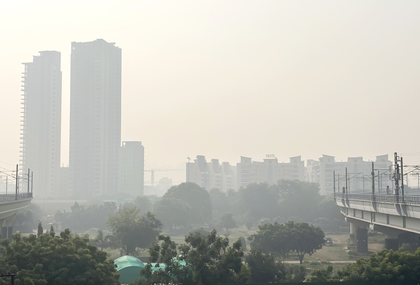Rising air pollution to spike respiratory diseases, stroke, heart attack, warn experts
By IANS | Updated: October 20, 2025 13:00 IST2025-10-20T12:59:29+5:302025-10-20T13:00:50+5:30
New Delhi, Oct 20 Even as the national capital woke up to toxic air on Monday morning with ...

Rising air pollution to spike respiratory diseases, stroke, heart attack, warn experts
New Delhi, Oct 20 Even as the national capital woke up to toxic air on Monday morning with the Air Quality Index (AQI) falling to the "very poor" category, health experts warned an increase in respiratory diseases, stroke, and heart attack, among others.
According to the Central Pollution Control Board (CPCB), Delhi recorded an Air Quality Index (AQI) of 335 at 8 am on Diwali morning after people burst crackers on the eve of the festival of lights, causing severe noise pollution and blanketing Delhi-NCR in smoke.
The CPCB’s forecast for the coming days indicates a similar trend, with the air quality expected to deteriorate further into the "severe" category on Tuesday and Wednesday.
“Increased exposure to air pollution has both acute short-term and long-term impacts on health. Short-term impacts include exacerbation of asthma, Chronic Obstructive Pulmonary Disease (COPD), shortness of breath, and itching in the eyes. Long-term exposure leads to cardio-respiratory diseases, stroke, heart attack, dementia, and mental health issues,” Dr Harshal R Salve, Additional Professor at the Centre for Community Medicine at AIIMS, New Delhi, told IANS.
The expert noted that children and the elderly more than 60 years, and those with pre-existing illnesses are more vulnerable to the impact of air pollution.
On Sunday, the city’s daily average AQI climbed to 296 ('poor'), surging to 300 by 6 p.m. and hitting 302 by 7 p.m., nudging it into the 'Very Poor' category, the CPCB said.
The air quality in the national capital is expected to worsen further as people have been granted permission to burst green crackers for a limited time by the Supreme Court.
“In the last few days or a week, the pollution has started rising in Delhi, and that has increased the sufferings of people who are having respiratory diseases or allergies, and this is expected to go higher in case there are significant firecrackers burned during the revaluation,” Dr. Ujjawal Parakh, senior consultant chest medicine from a leading hospital in Delhi, told IANS.
“So, this is a vulnerable period for people who are suffering from respiratory diseases because they can have exacerbation or an increase in symptoms in these times,” Parakh said.
Salve recommended the need for reducing emissions by strict implementation of curbs on diesel vehicles, management of dust at construction sites, and regulating industrial exhausts. At the individual level, one must stop burning waste and stubble and use sustainable energy resources, he said.
The doctor also suggested avoiding early morning outdoor activities, using an N95 mask when outdoors, and taking fruits and vegetables (up to five servings a day), especially citrus fruits rich in antioxidants, to prevent the impact of air pollution on the human body.
“During the time of pollution, patients suffering from respiratory disease are advised to continue taking all their medications regularly. They should ideally remain inside the house in rooms with the air conditioner on, so that the effect of pollution during the heightened period of the AQI does not affect them or has very minimal effect,” Parakh said.
Meanwhile, the deepening air quality crisis has prompted the Commission for Air Quality Management (CAQM) in the NCR and adjoining areas to swiftly activate Stage-II of the Graded Response Action Plan (GRAP).
CAQM has also urged citizens to embrace public transport, avoid dusty construction, and shun waste burning.
Disclaimer: This post has been auto-published from an agency feed without any modifications to the text and has not been reviewed by an editor
Open in app